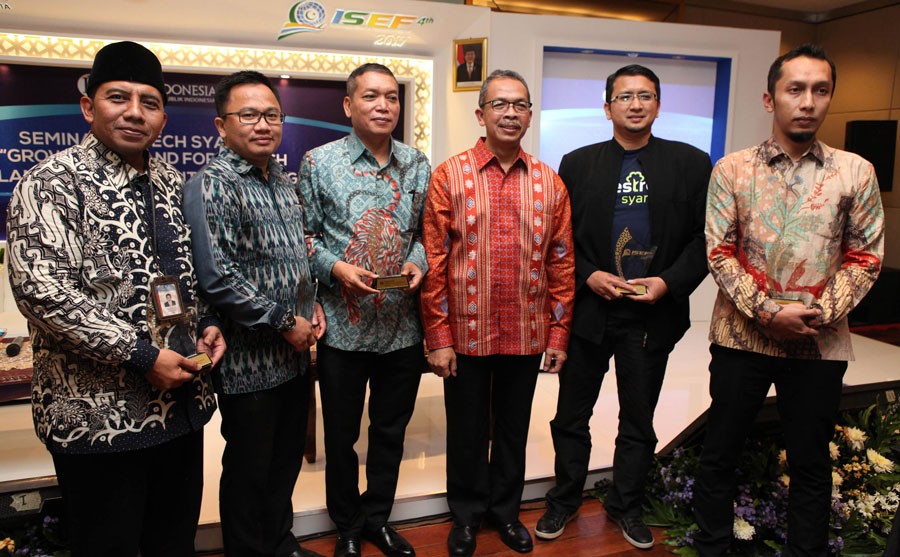Popular Reads
Top Results
Can't find what you're looking for?
View all search resultsPopular Reads
Top Results
Can't find what you're looking for?
View all search resultsSharia banks ready to finance more infrastructure projects
Change text size
Gift Premium Articles
to Anyone
 Bank Indonesia deputy governor Sugeng (third from right) pose for a photograph with speakers (from left to right) Bank Indonesia director for electronics and financial inclusion Pungky P. Wibowo, Muamalat Bank commissioner Iggi Achsien, journalist who acts as a moderator Eko B.S, Investree COO Ade Fauzan, and academician Nofie Iman after opening a Sharia Fintech seminar themed “Growing Demand for Fintech in Islamic Finance and Its Challenges” in Surabaya. The seminar was held in conjunction with the 2017 Indonesia Sharia Economic Festival on Nov.10. (JP/Arief Suhardiman)
Bank Indonesia deputy governor Sugeng (third from right) pose for a photograph with speakers (from left to right) Bank Indonesia director for electronics and financial inclusion Pungky P. Wibowo, Muamalat Bank commissioner Iggi Achsien, journalist who acts as a moderator Eko B.S, Investree COO Ade Fauzan, and academician Nofie Iman after opening a Sharia Fintech seminar themed “Growing Demand for Fintech in Islamic Finance and Its Challenges” in Surabaya. The seminar was held in conjunction with the 2017 Indonesia Sharia Economic Festival on Nov.10. (JP/Arief Suhardiman)
S
haria banks have expressed confidence the industry would see accelerated asset growth if given government support to finance infrastructure projects.
“The total assets of sharia banks are currently only around US$30 billion. If there was support from the government (to finance infrastructure projects), we could double the total assets of sharia banking by 2019,” said Maybank head of sharia banking, Herwin Bustaman, on the sidelines of the Indonesian Sharia Economic Festival (ISEF) 2017 in Surabaya on Friday.
Because of its small capital and the high cost of funds owing to the high composition of deposits, sharia banks have tended to focus their financing on retail and small and medium-sized enterprises (SMEs).
However, Herwin told reporters that sharia banks now had the ability to fund big infrastructure projects, which require large investments, but would also yield high returns.
As an example, he referred to the involvement of sharia banks in the combined conventional and sharia loan given to state-owned electricity company PLN of Rp 16.3 trillion (US$1.20 billion), the biggest syndicated loan ever in Indonesia.
The sharia scheme contributed Rp 4.3 trillion with a 10-year term involving numerous banks that offer sharia financing including Maybank Indonesia, Bank Mandiri Syariah, BNI Syariah and Bank Permata Syariah.
Herwin said the sharia bank loan showed they had the capabilities to finance infrastructure projects. Furthermore, the size of the loan would also attract worldwide attention, particularly from potential investors.
“We hope there will be investors from abroad that are eager to come to Indonesia to provide sharia financing, because we need funds, while the funds in Indonesia are limited, and so, hopefully we can get funding in large amounts from abroad with a longer tenor,” he said.
However, he added that the support of the government through its policies would be vital to boost the confidence and capabilities of sharia banks to finance infrastructure projects. Two policies he mentioned in particular were the government’s move to allow civil servants to use sharia bank accounts as their salary account and the new rule regarding haj funds, which requires all haj-goers to place their haj fund deposits in sharia banks.
“These are the kinds of things we hope will help grow the industry,” Herwin said.
However, regarding the haj rule, which was issued through the haj and umrah director general’s decree, not all sharia banks will be allowed to part in the haj scheme as the government will conduct a lengthy selection process to choose its partner banks for the haj fund scheme, abbreviated as BPS-BPIH.
According to the newly-formed Haj Fund Management Agency (BPKH), which will manage the haj funds from the partner banks, it has set nine requirements for sharia banks to take part in the BPS-BPIH. The requirements include having sound IT capabilities, having a large number of registered haj and umrah-bound customers and being able to create a virtual account for their customers wanting to make haj deposits.
“The whole selection process will be finalized in December 2017,” said BPKH coordinator Anggito Abimanyu.
Furthermore, he added that the agency expected the partner banks to have 400,000 new pilgrims every year.
“Our target is that these banks (BPS-BPIH) must be able to get 400,000 new pilgrims every year. At the moment, it is still around 300,000 people,” he said.
Anggito also explained that the haj funds transferred by the banks to the BPKH would be invested in sharia compliant instruments. The annual return of the investments, targeted at 6 percent next year, would be given to the haj goers.
As of June 2017, the total amount of haj funds managed by the government was Rp 99.5 trillion. By the end of this year, the BPKH expects that figure to rise to Rp 101.6 trillion.









